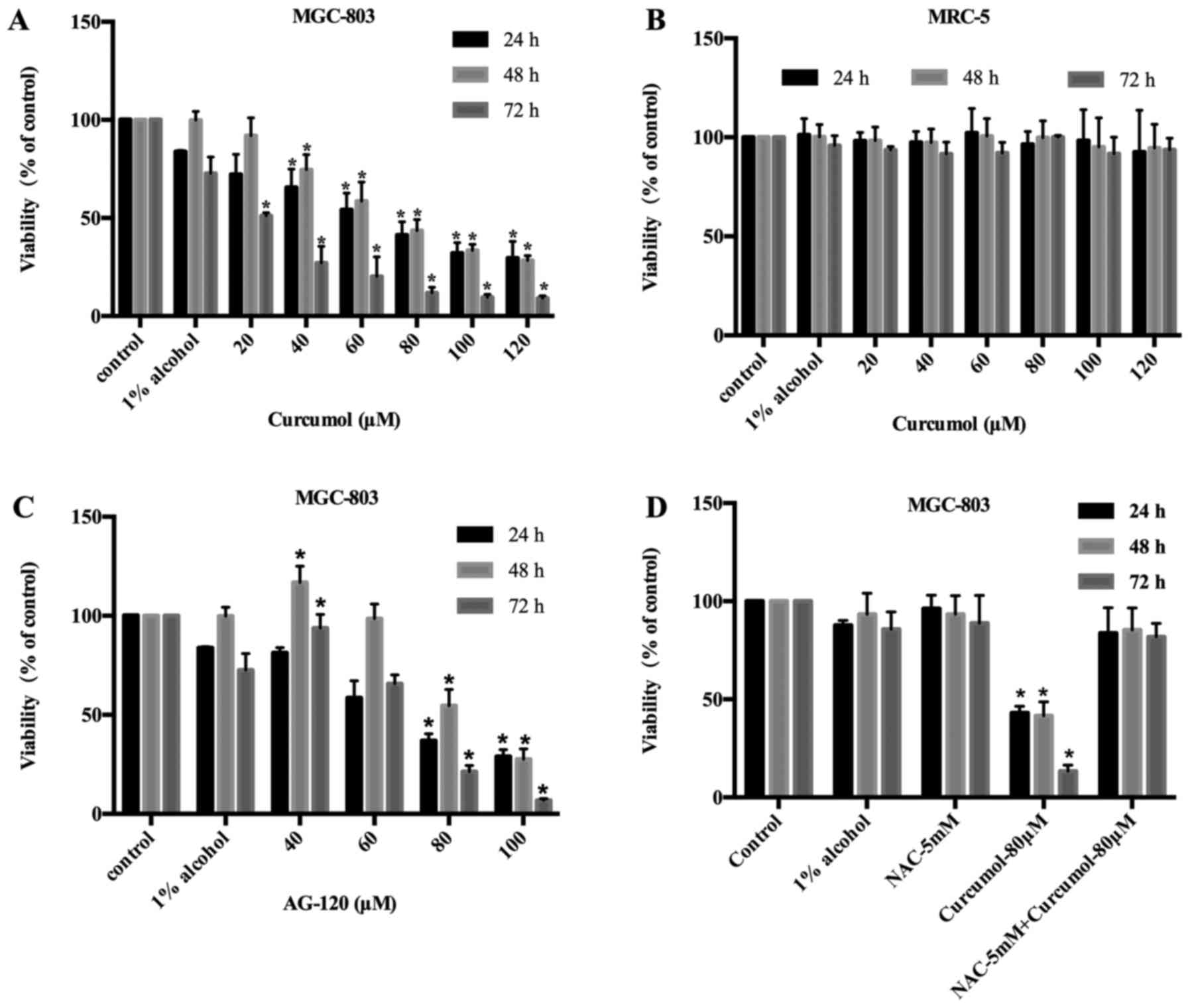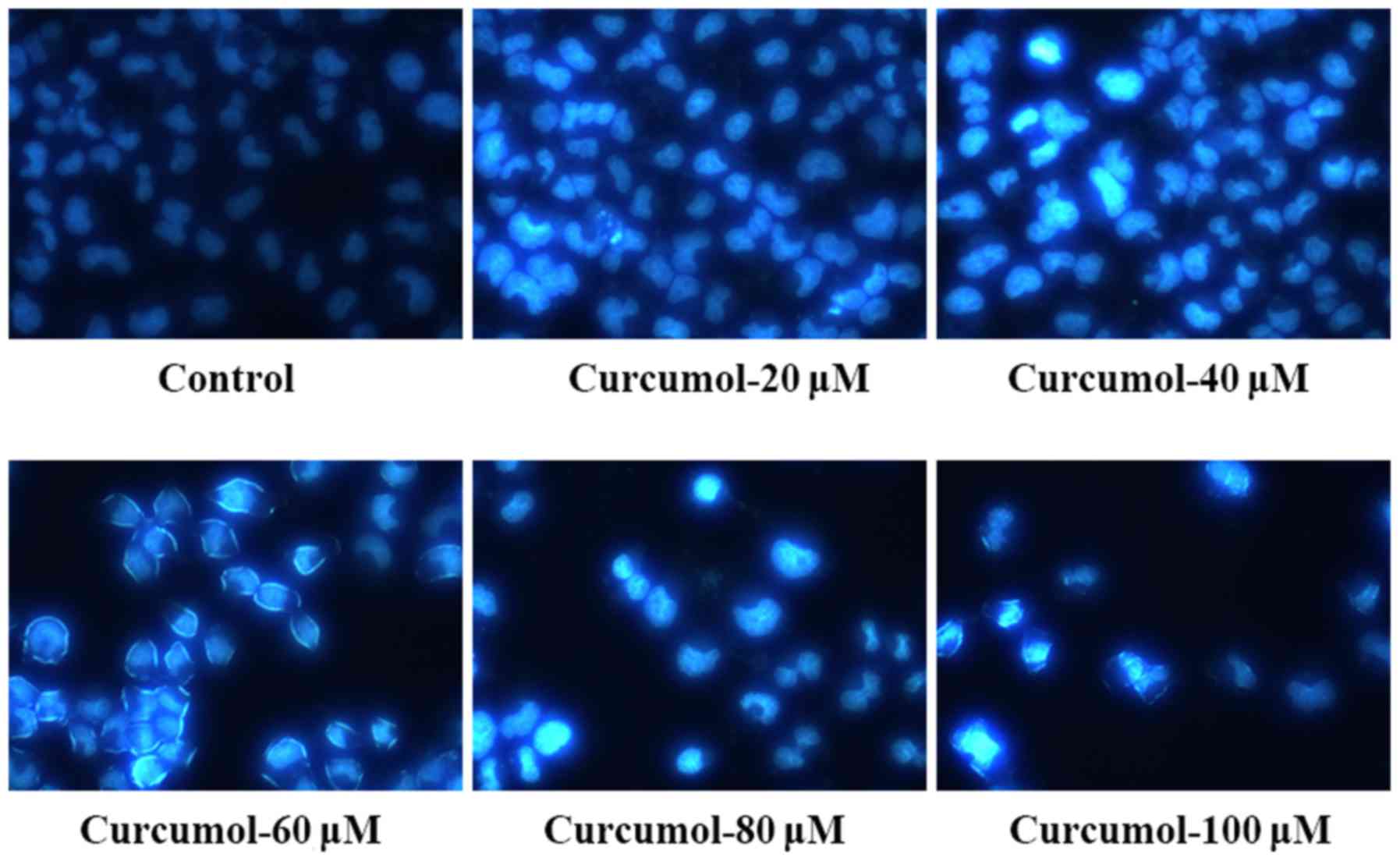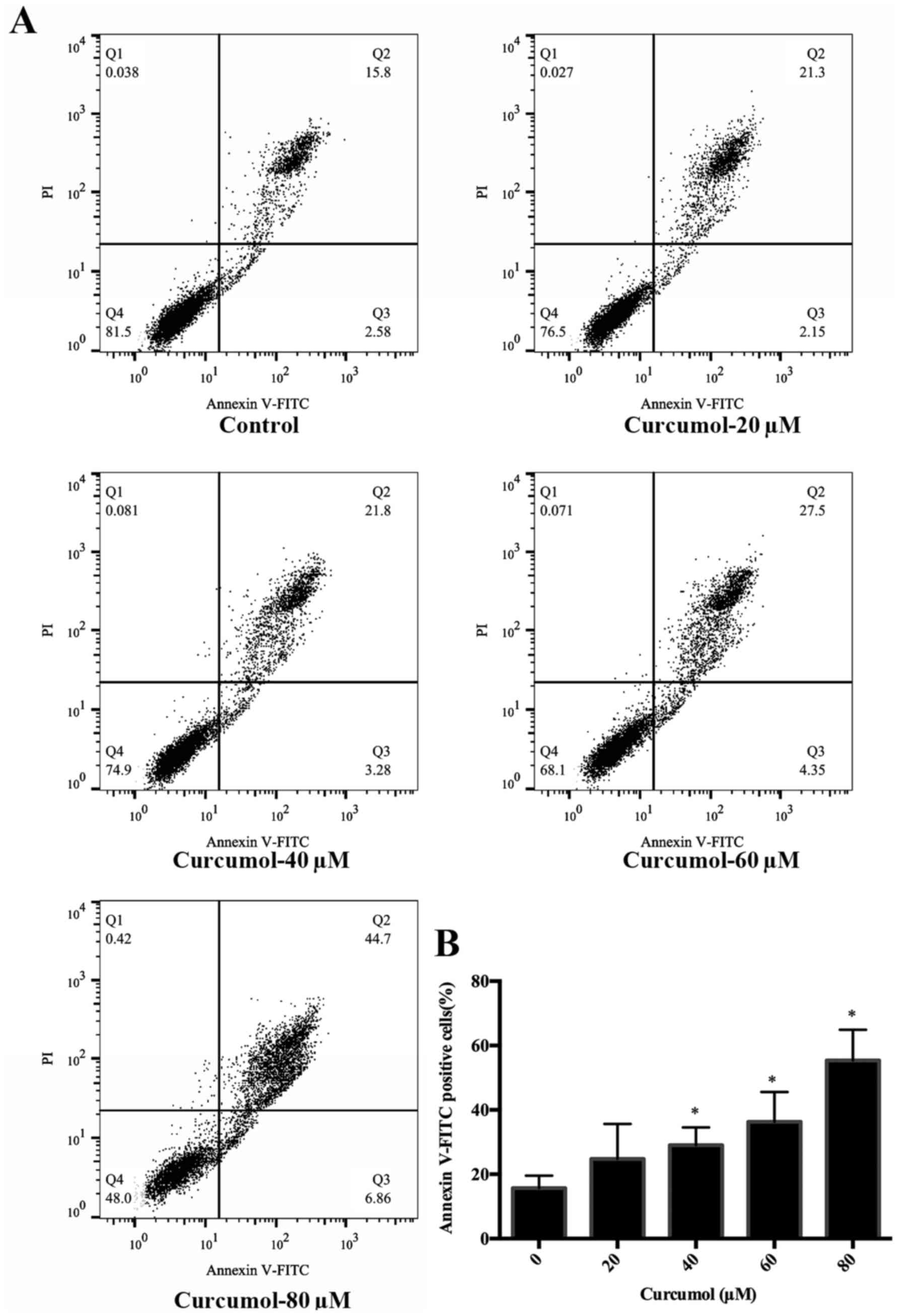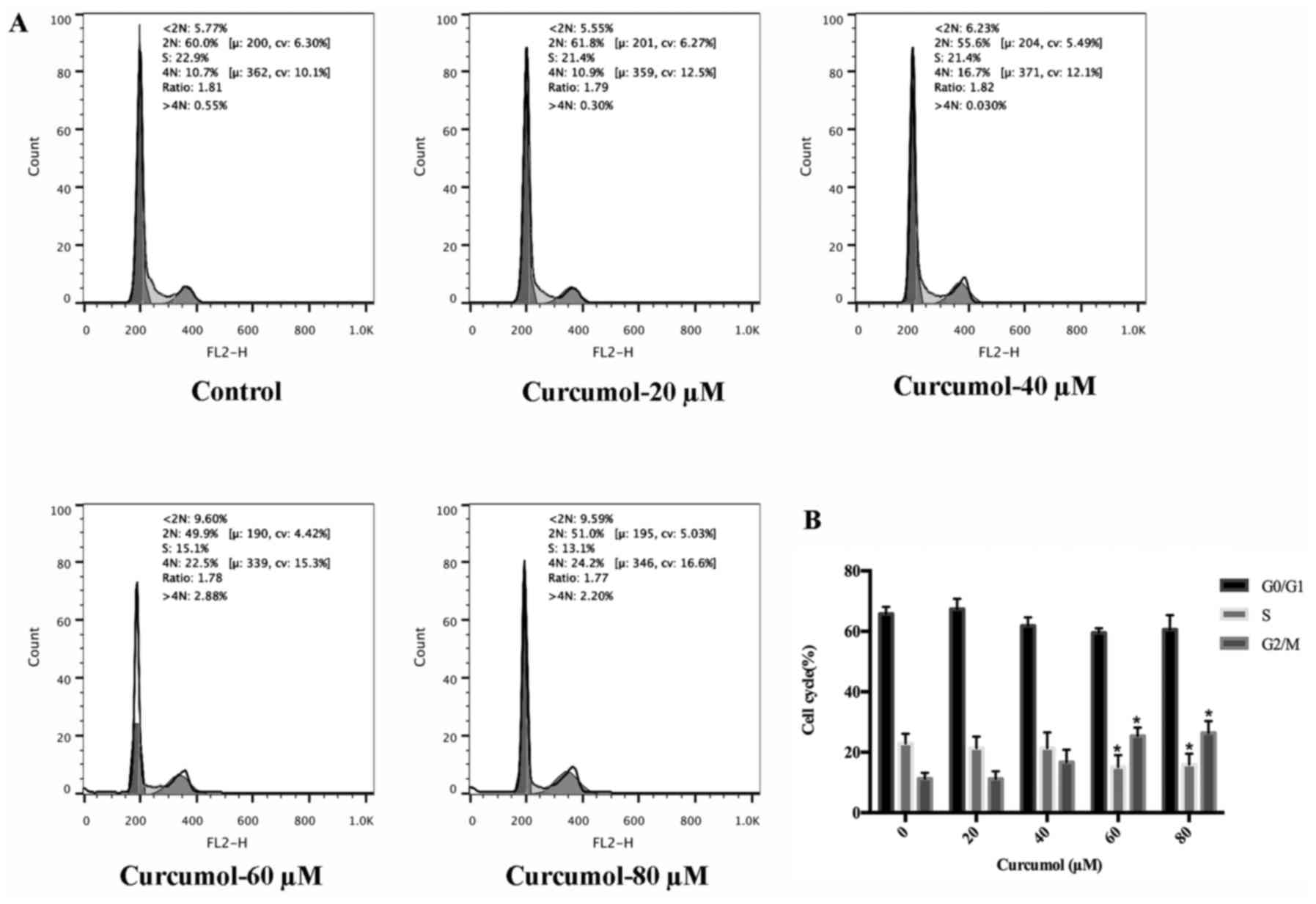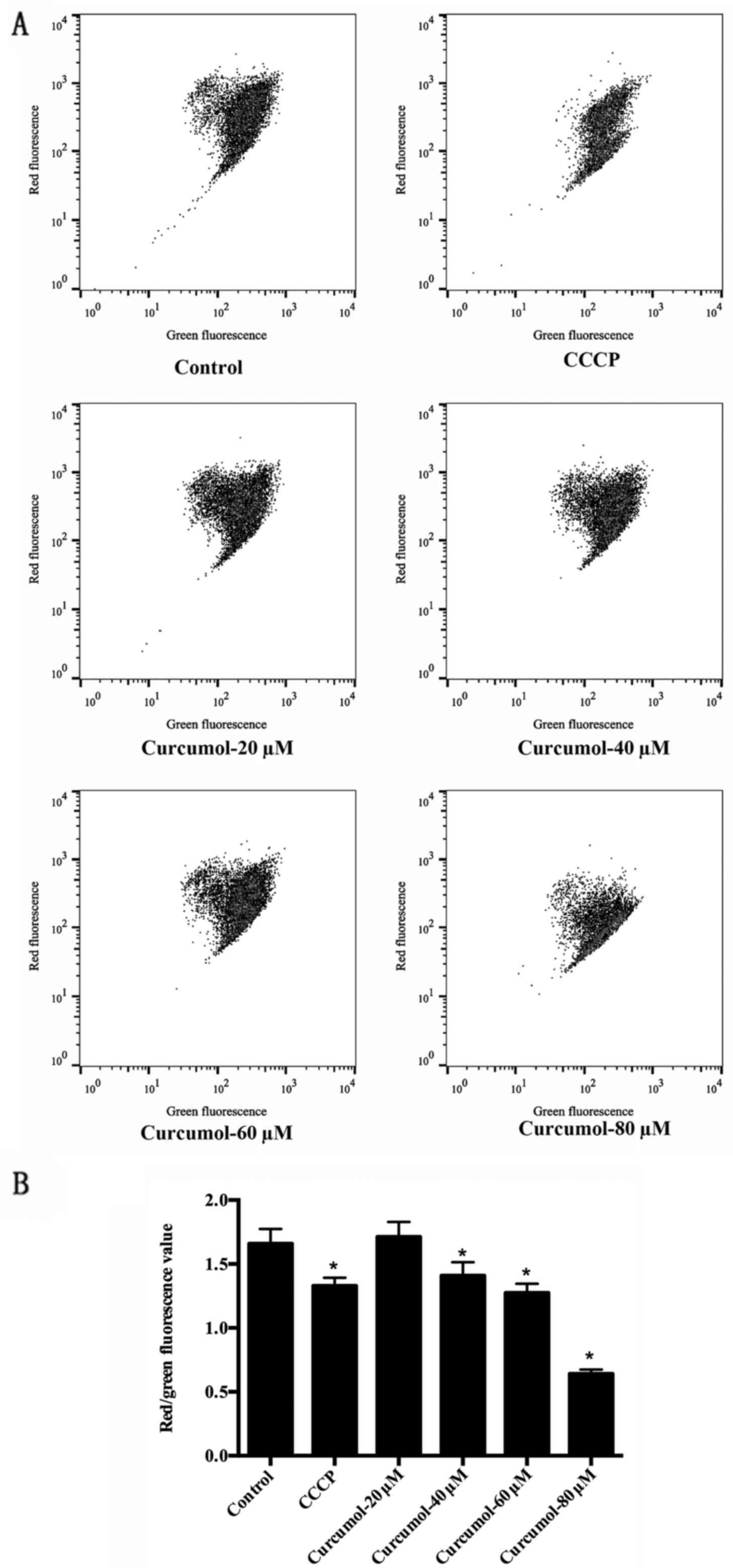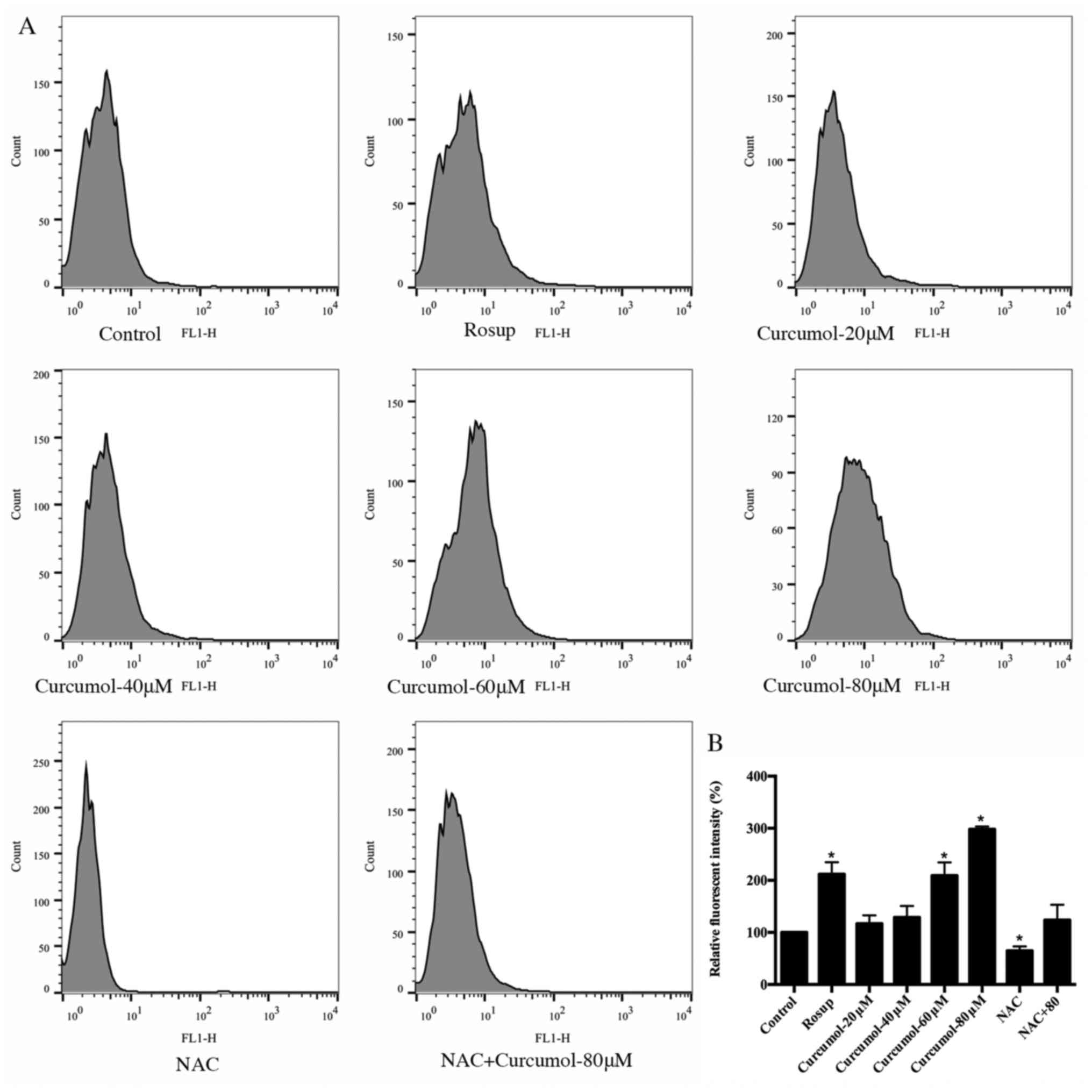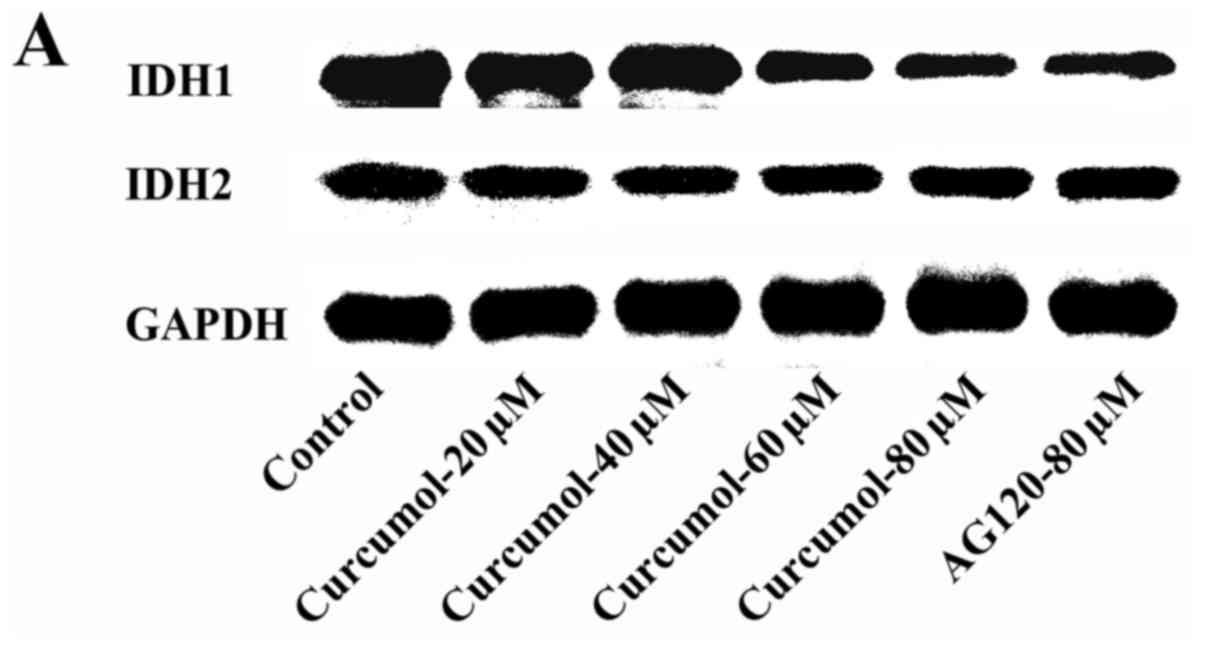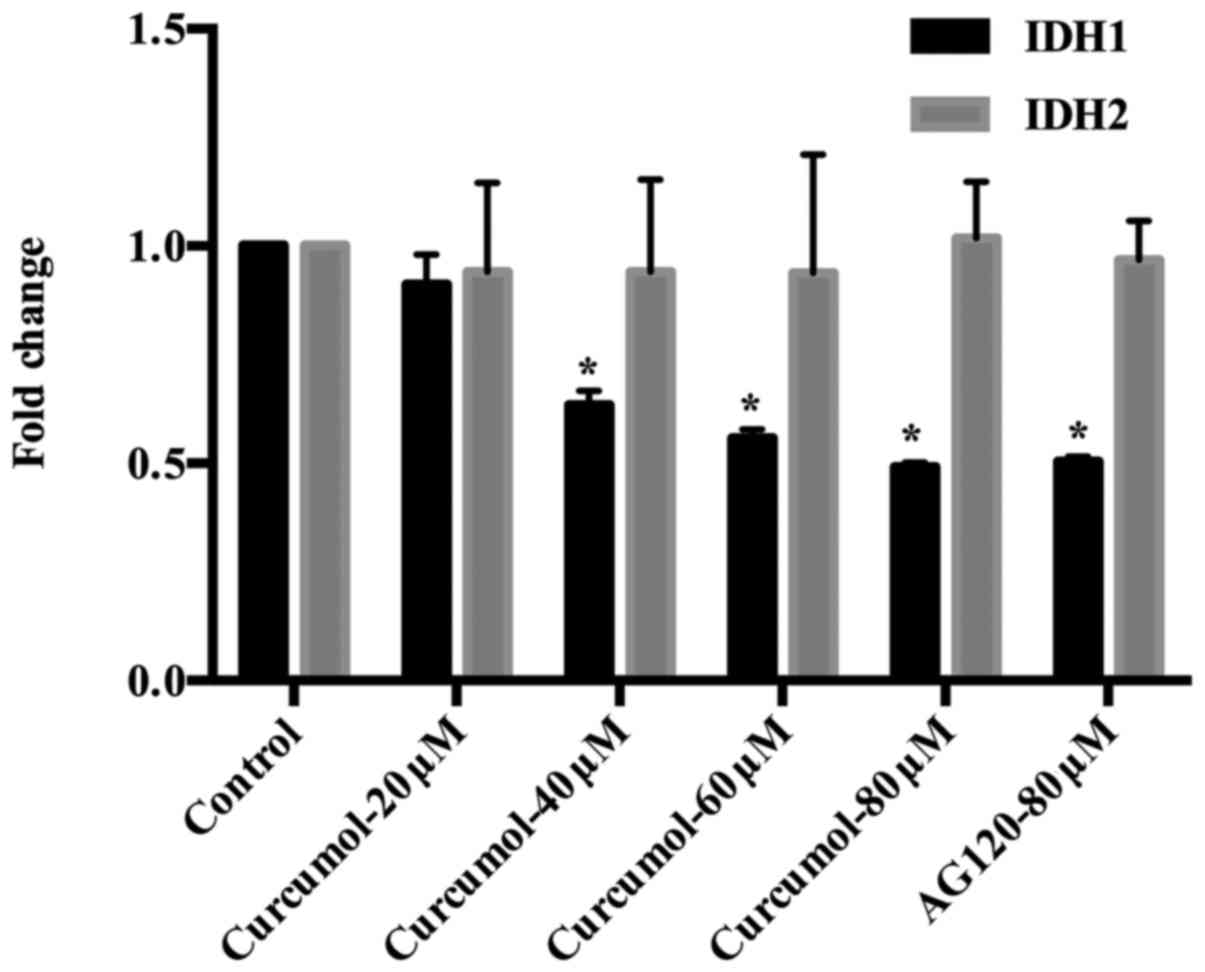|
1
|
Torre LA, Bray F, Siegel RL, Ferlay J,
Lortet-Tieulent J and Jemal A: Global cancer statistics, 2012. CA
Cancer J Clin. 65:87–108. 2015. View Article : Google Scholar : PubMed/NCBI
|
|
2
|
Hudler P: Challenges of deciphering
gastric cancer heterogeneity. World J Gastroenterol.
21:10510–10527. 2015. View Article : Google Scholar : PubMed/NCBI
|
|
3
|
Chen W, Zheng R, Baade PD, Zhang S, Zeng
H, Bray F, Jemal A, Yu XQ and He J: Cancer statistics in China,
2015. CA Cancer J Clin. 66:115–132. 2016. View Article : Google Scholar : PubMed/NCBI
|
|
4
|
Xu W, Yang Z and Lu N: Molecular targeted
therapy for the treatment of gastric cancer. J Exp Clin Cancer Res.
35:12016. View Article : Google Scholar : PubMed/NCBI
|
|
5
|
Ko YC, Lien JC, Liu HC, Hsu SC, Ji BC,
Yang MD, Hsu WH and Chung JG: Demethoxycurcumin induces the
apoptosis of human lung cancer NCI-H460 cells through the
mitochondrial-dependent pathway. Oncol Rep. 33:2429–2437. 2015.
View Article : Google Scholar : PubMed/NCBI
|
|
6
|
Gomez-Martín C, Lopez-Rios F, Aparicio J,
Barriuso J, García-Carbonero R, Pazo R, Rivera F, Salgado M, Salud
A, Vázquez-Sequeiros E, et al: A critical review of HER2-positive
gastric cancer evaluation and treatment: From trastuzumab, and
beyond. Cancer Lett. 351:30–40. 2014. View Article : Google Scholar : PubMed/NCBI
|
|
7
|
Al-Batran SE, Ducreux M and Ohtsu A: mTOR
as a therapeutic target in patients with gastric cancer. Int J
Cancer. 130:491–496. 2012. View Article : Google Scholar : PubMed/NCBI
|
|
8
|
Zhang K, Cui J, Xi H, Bian S, Ma L, Shen
W, Li J, Wang N, Wei B and Chen L: Serum HER2 is a potential
surrogate for tissue HER2 status in gastric cancer: A systematic
review and meta-analysis. PLoS One. 10:e01363222015. View Article : Google Scholar : PubMed/NCBI
|
|
9
|
Liu JS, He SC, Zhang ZL, Chen R, Fan L,
Qiu GL, Chang S, Li L and Che XM: Anticancer effects of β-elemene
in gastric cancer cells and its potential underlying proteins: A
proteomic study. Oncol Rep. 32:2635–2647. 2014. View Article : Google Scholar : PubMed/NCBI
|
|
10
|
Cai XZ, Huang WY, Qiao Y, Du SY, Chen Y,
Chen D, Yu S, Che RC, Liu N and Jiang Y: Inhibitory effects of
curcumin on gastric cancer cells: A proteomic study of molecular
targets. Phytomedicine. 20:495–505. 2013. View Article : Google Scholar : PubMed/NCBI
|
|
11
|
Cai LJ, Song SP, Lu B and Meng LN:
Reversal effect of curcuma wenyujin extract on SGC-7901/VCR induced
subcutaneous transplanted tumor in nude mice and its effect on the
expression of P-glycoprotein. Zhongguo Zhong Xi Yi Jie He Za Zhi.
34:1347–1353. 2014.(In Chinese). PubMed/NCBI
|
|
12
|
Guo P, Wang YW, Weng BX, Li XK, Yang SL
and Ye FQ: Synthesis, anti-tumor activity, and structure-activity
relationships of curcumol derivatives. J Asian Nat Prod Res.
16:53–58. 2014. View Article : Google Scholar : PubMed/NCBI
|
|
13
|
Tang QL, Guo JQ, Wang QY, Lin HS, Yang ZP,
Peng T, Pan XD, Liu B, Wang SJ and Zang LQ: Curcumol induces
apoptosis in SPC-A-1 human lung adenocarcinoma cells and displays
anti-neoplastic effects in tumor bearing mice. Asian Pac J Cancer
Prev. 16:2307–2312. 2015. View Article : Google Scholar : PubMed/NCBI
|
|
14
|
Gao C, Ding Z, Liang B, Chen N and Cheng
D: Study on the effects of curcumin on angiogenesis. Zhong Yao Cai.
26:499–502. 2003.(In Chinese). PubMed/NCBI
|
|
15
|
Lu JJ, Dang YY, Huang M, Xu WS, Chen XP
and Wang YT: Anti-cancer properties of terpenoids isolated from
Rhizoma Curcumae - a review. J Ethnopharmacol. 143:406–411. 2012.
View Article : Google Scholar : PubMed/NCBI
|
|
16
|
Thani Abdullah NA, Sallis B, Nuttall R,
Schubert FR, Ahsan M, Davies D, Purewal S, Cooper A and Rooprai HK:
Induction of apoptosis and reduction of MMP gene expression in the
U373 cell line by polyphenolics in Aronia melanocarpa and by
curcumin. Oncol Rep. 28:1435–1442. 2012. View Article : Google Scholar : PubMed/NCBI
|
|
17
|
Fan H, Liang Y, Jiang B, Li X, Xun H, Sun
J, He W, Lau HT and Ma X: Curcumin inhibits intracellular fatty
acid synthase and induces apoptosis in human breast cancer
MDA-MB-231 cells. Oncol Rep. 35:2651–2656. 2016. View Article : Google Scholar : PubMed/NCBI
|
|
18
|
Du Q, Hu B, An HM, Shen KP, Xu L, Deng S
and Wei MM: Synergistic anticancer effects of curcumin and
resveratrol in Hepa1-6 hepatocellular carcinoma cells. Oncol Rep.
29:1851–1858. 2013. View Article : Google Scholar : PubMed/NCBI
|
|
19
|
Zhao G, Han X, Zheng S, Li Z, Sha Y, Ni J,
Sun Z, Qiao S and Song Z: Curcumin induces autophagy, inhibits
proliferation and invasion by downregulating AKT/mTOR signaling
pathway in human melanoma cells. Oncol Rep. 35:1065–1074. 2016.
View Article : Google Scholar : PubMed/NCBI
|
|
20
|
Park EH, Bae WY, Eom SJ, Kim KT and Paik
HD: Improved antioxidative and cytotoxic activities of chamomile
(Matricaria chamomilla) florets fermented by
Lactobacillus plantarum KCCM 11613P. J Zhejiang Univ Sci B.
18:152–160. 2017. View Article : Google Scholar : PubMed/NCBI
|
|
21
|
Narita Y and Muro K: Challenges in
molecular targeted therapy for gastric cancer: Considerations for
efficacy and safety. Expert Opin Drug Saf. 16:319–327. 2016.
View Article : Google Scholar : PubMed/NCBI
|
|
22
|
Han J, Meng Q, Xi Q, Wang H and Wu G:
PFKFB3 was overexpressed in gastric cancer patients and promoted
the proliferation and migration of gastric cancer cells. Cancer
Biomark. 18:249–256. 2017. View Article : Google Scholar : PubMed/NCBI
|
|
23
|
Kang Y, Hu W, Bai E, Zheng H, Liu Z, Wu J,
Jin R, Zhao C and Liang G: Curcumin sensitizes human gastric cancer
cells to 5-fluorouracil through inhibition of the NFκB
survival-signaling pathway. Onco Targets Ther. 9:7373–7384. 2016.
View Article : Google Scholar : PubMed/NCBI
|
|
24
|
Guo X, Zhang L, Fan Y, Zhang D, Qin L,
Dong S and Li G: Oxysterol binding protein-related protein 8
inhibits gastric cancer growth through induction of ER stress,
inhibition of Wnt signaling and activation of apoptosis. Oncol Res.
25:799–808. 2017. View Article : Google Scholar : PubMed/NCBI
|
|
25
|
Echizen K, Hirose O, Maeda Y and Oshima M:
Inflammation in gastric cancer: Interplay of the
COX-2/prostaglandin E2 and Toll-like receptor/MyD88 pathways.
Cancer Sci. 107:391–397. 2016. View Article : Google Scholar : PubMed/NCBI
|
|
26
|
DeNicola GM, Karreth FA, Humpton TJ,
Gopinathan A, Wei C, Frese K, Mangal D, Yu KH, Yeo CJ, Calhoun ES,
et al: Oncogene-induced Nrf2 transcription promotes ROS
detoxification and tumorigenesis. Nature. 475:106–109. 2011.
View Article : Google Scholar : PubMed/NCBI
|
|
27
|
Ishikawa K, Takenaga K, Akimoto M,
Koshikawa N, Yamaguchi A, Imanishi H, Nakada K, Honma Y and Hayashi
J: ROS-generating mitochondrial DNA mutations can regulate tumor
cell metastasis. Science. 320:661–664. 2008. View Article : Google Scholar : PubMed/NCBI
|
|
28
|
Yee C, Yang W and Hekimi S: The intrinsic
apoptosis pathway mediates the pro-longevity response to
mitochondrial ROS in C. elegans. Cell. 157:897–909. 2014.
View Article : Google Scholar : PubMed/NCBI
|
|
29
|
Zhao X, Xu L, Zheng L, Yin L, Qi Y, Han X,
Xu Y and Peng J: Potent effects of dioscin against gastric cancer
in vitro and in vivo. Phytomedicine. 23:274–282. 2016. View Article : Google Scholar : PubMed/NCBI
|
|
30
|
Wang SQ, Wang C, Wang JW, Yang DX, Wang R,
Wang CJ, Li HJ, Shi HG, Ke Y and Liu HM: Geridonin, a novel
derivative of oridonin, inhibits proliferation of MGC 803 cells
both in vitro and in vivo through elevating the intracellular ROS.
J Pharm Pharmacol. 69:213–221. 2017. View Article : Google Scholar : PubMed/NCBI
|
|
31
|
Shi XJ, Yu B, Wang JW, Qi PP, Tang K,
Huang X and Liu HM: Structurally novel steroidal spirooxindole
by241 potently inhibits tumor growth mainly through ROS-mediated
mechanisms. Sci Rep. 6:316072016. View Article : Google Scholar : PubMed/NCBI
|
|
32
|
Zhou Y, Wei L, Zhang H, Dai Q, Li Z, Yu B,
Guo Q and Lu N: FV-429 induced apoptosis through ROS-mediated ERK2
nuclear translocation and p53 activation in gastric cancer cells. J
Cell Biochem. 116:1624–1637. 2015. View Article : Google Scholar : PubMed/NCBI
|
|
33
|
Huang XC, Jin L, Wang M, Liang D, Chen ZF,
Zhang Y, Pan YM and Wang HS: Design, synthesis and in vitro
evaluation of novel dehydroabietic acid derivatives containing a
dipeptide moiety as potential anticancer agents. Eur J Med Chem.
89:370–385. 2015. View Article : Google Scholar : PubMed/NCBI
|
|
34
|
Ye MY, Yao GY, Pan YM, Liao ZX, Zhang Y
and Wang HS: Synthesis and antitumor activities of novel
α-aminophosphonate derivatives containing an alizarin moiety. Eur J
Med Chem. 83:116–128. 2014. View Article : Google Scholar : PubMed/NCBI
|
|
35
|
Li JF, Huang RZ, Yao GY, Ye MY, Wang HS,
Pan YM and Xiao JT: Synthesis and biological evaluation of novel
aniline-derived asiatic acid derivatives as potential anticancer
agents. Eur J Med Chem. 86:175–188. 2014. View Article : Google Scholar : PubMed/NCBI
|
|
36
|
Zhou Y, Tian L, Long L, Quan M, Liu F and
Cao J: Casticin potentiates TRAIL-induced apoptosis of gastric
cancer cells through endoplasmic reticulum stress. PLoS One.
8:e588552013. View Article : Google Scholar : PubMed/NCBI
|
|
37
|
Wu C, Wang C, Han T, Zhou X, Guo S and
Zhang J: Insight into the cellular internalization and cytotoxicity
of graphene quantum dots. Adv Healthc Mater. 2:1613–1619. 2013.
View Article : Google Scholar : PubMed/NCBI
|
|
38
|
Qian X, Li J, Ding J, Wang Z, Duan L and
Hu G: Glibenclamide exerts an antitumor activity through reactive
oxygen species-c-jun NH2-terminal kinase pathway in human gastric
cancer cell line MGC-803. Biochem Pharmacol. 76:1705–1715. 2008.
View Article : Google Scholar : PubMed/NCBI
|
|
39
|
Chen CW, Chan YC, Hsiao M and Liu RS:
Plasmon-enhanced photodynamic cancer therapy by upconversion
nanoparticles conjugated with Au nanorods. ACS Appl Mater
Interfaces. 8:32108–32119. 2016. View Article : Google Scholar : PubMed/NCBI
|
|
40
|
Liu L, Fu L, Jing T, Ruan Z and Yan L:
pH-triggered polypeptides nanoparticles for efficient BODIPY
imaging-guided near infrared photodynamic therapy. ACS Appl Mater
Interfaces. 8:8980–8990. 2016. View Article : Google Scholar : PubMed/NCBI
|
|
41
|
Chou NH, Tsai CY, Tu YT, Wang KC, Kang CH,
Chang PM, Li GC, Lam HC, Liu SI and Tsai KW: Isocitrate
dehydrogenase 2 dysfunction contributes to 5-hydroxymethylcytosine
depletion in gastric cancer cells. Anticancer Res. 36:3983–3990.
2016.PubMed/NCBI
|
|
42
|
Jiang L, Shestov AA, Swain P, Yang C,
Parker SJ, Wang QA, Terada LS, Adams ND, McCabe MT, Pietrak B, et
al: Reductive carboxylation supports redox homeostasis during
anchorage-independent growth. Nature. 532:255–258. 2016. View Article : Google Scholar : PubMed/NCBI
|
|
43
|
Lian CG, Xu Y, Ceol C, Wu F, Larson A,
Dresser K, Xu W, Tan L, Hu Y, Zhan Q, et al: Loss of
5-hydroxymethylcytosine is an epigenetic hallmark of melanoma.
Cell. 150:1135–1146. 2012. View Article : Google Scholar : PubMed/NCBI
|
|
44
|
IDH1 inhibitor shows promising early
results. Cancer Discov. 5:42015.
|
|
45
|
Shi H, Tan B, Ji G, Lu L, Cao A, Shi S and
Xie J: Zedoary oil (Ezhu You) inhibits proliferation of AGS
cells. Chin Med. 8:132013. View Article : Google Scholar : PubMed/NCBI
|















